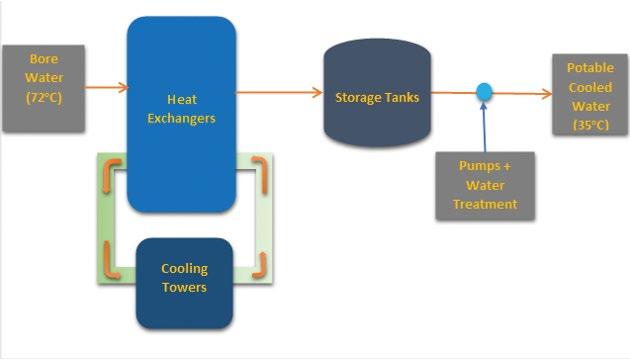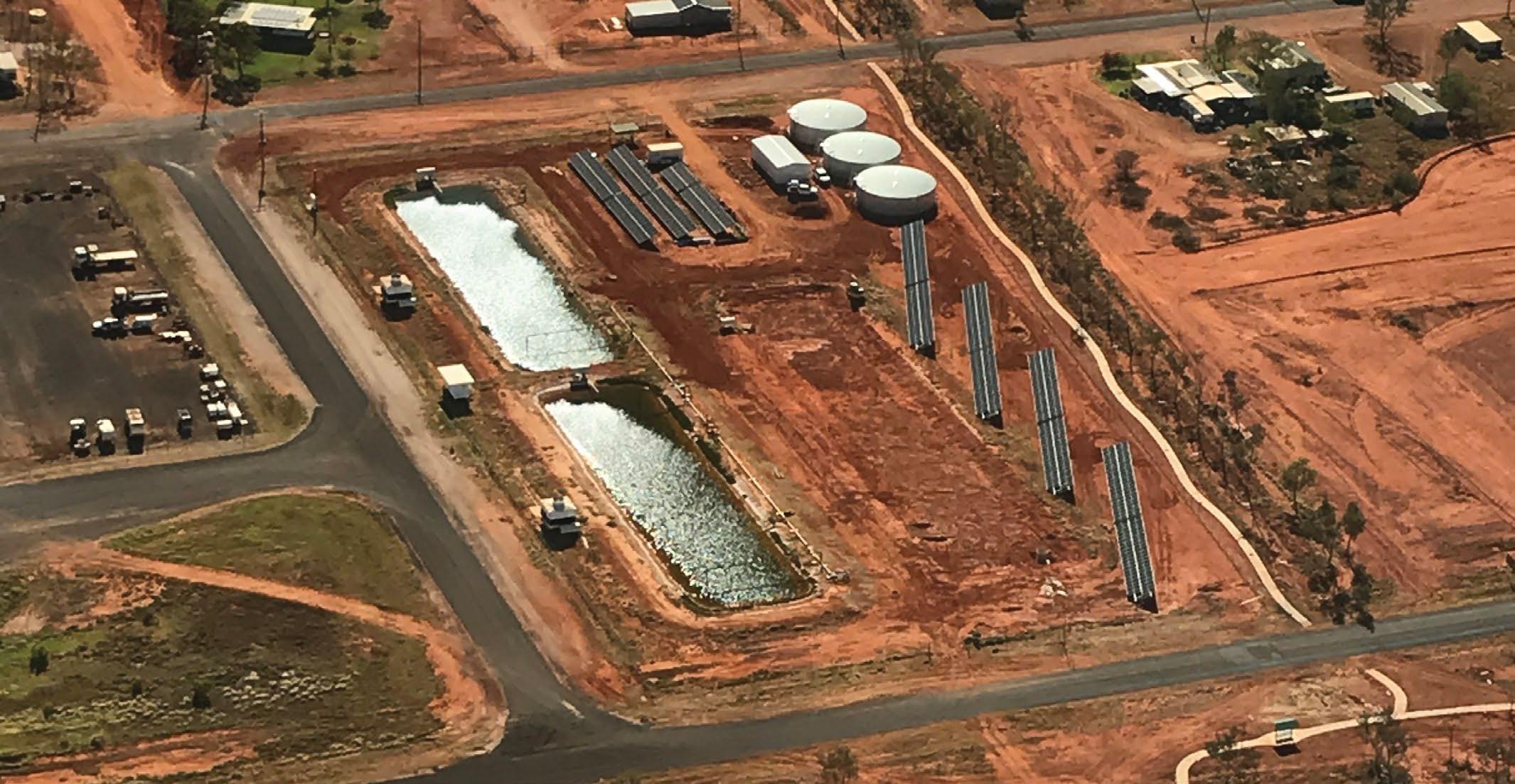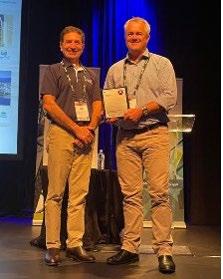
5 minute read
Councils Are Going Green
COUNCILS ARE GOING GREEN, SAVING MONEY AND MEETING COMMUNITY NEEDS
Paul Renals, Project Advisory Leader and Mike Fideli, Energy Consultant, Peak Services
Bulloo Shire Council has invested in a new watercooling system that is set to deliver significant benefits to the council and its community. The new project will cool the 70-degree celsius bore water supply which feeds the town, to a refreshing 35 degrees. The system will be powered on renewable energy, reduce water supply risk, provide data and control for council through its management system and has specifically been designed for reliability and ease of maintenance.
Like many regional remote councils, Bulloo Shire Council’s community relies on water supply from bores. While water quality is potable, without treatment the water temperature is well in excess of an acceptable level when it comes out of the tap.
For many years, the council has relied on a system of cooling towers and ponds although this system struggles through hot summers, reducing the water to unsatisfactory temperatures of around 55 degrees. That is about the temperature of a hot shower, which is far from refreshing when it is over 40 degrees outside! This cooling process costs council over $70,000 annually in electricity and with much of the infrastructure nearing the end of its useful life, mounting maintenance and renewal costs have pushed the agenda for a better solution.
The profit-for-purpose enterprise Peak Services, which the Local Government Association of Queensland wholly owns, has been working with Bulloo Shire Council for several years to diligently identify and evaluate the financial, technical, environmental and social benefits of numerous options. The chosen project harnesses heat exchangers and cooling towers’ efficiency to cool the 72 degrees bore water to 35 degrees at a variable rate up to 30 l/s. The cooled water is stored in three 500 KL water storage tanks. Multiple variable speed pumps work to meet community demand for up to 45l/s at a constant pressure to meet peak demands.
The project is entirely powered using renewable energy, reducing the risk of grid supply issues that are common in remote locations. This significantly reduces the cost of the operation with associated environmental benefits also achieved. The 240kW solar power plant is designed to power all system components during the day, with sufficient capacity to charge the 583kWh battery storage for uninterrupted operation during night and low solar insolation periods. The renewable energy capacity is adequate to cool, treat and deliver up to 1.5ML of potable water per day to the community.
The system is managed through a water management system that constantly monitors and
Simplified layout of the cooling system.

Pump shed at the cooling ponds.
adjusts performance to optimise its use of renewable energy and maximise its battery and water storage levels. Through VPN access, council can remotely monitor and control the system and respond to alarms and alerts. The system includes fail-safe and shut-off mechanisms to mitigate any potential issues with flooding, power failure of loss or water supply.
Risk and performance focused
Selecting the best option to deliver this work included a significant focus on risk reduction and management. Extensive supplier engagement and feasibility assessment was undertaken to understand and consider risks such as whether the technology is proven and readily available, the cost of maintenance and operations, availability of spares, reliability and redundancy. The project also had a requirement to create opportunity for local suppliers and resource to be involvement in its construction and maintenance. The contractor was procured using a design and construct form contract that was modified to detail the council’s project requirements, location specific specifications and rigorous performance guarantees. Tenders called for schematic design solutions, the nomination of suppliers and technical schedules to enable the tender evaluation panel to undertake rigorous analysis and negotiate best outcomes and value for money for council before contract execution. NRG Services was selected from an open tender process.
Delivering in a challenging environment
The effort invested in the tender documentation, evaluation process and resulting contractor selection has supported a streamlined delivery program. Aided by well-defined project performance requirements and with performance and delivery risks appropriately apportioned to the contractor, the design was finalised within two months of award. This allowed early procurement of long-lead items and site establishment and enabled general works and highrisk ground works to commence early. Where practical, equipment was modulised to allow easier installation on site. Local resources were engaged to supply and support the main contractor in construction for a significant proportion of the project. This not only supports the local economy but also boosts local knowledge when maintenance is required.
Delivery was challenged by the impacts of border restrictions and lockdowns on suppliers; however the project is currently undergoing commissioning and performance guarantee testing to achieve completion in March 2021.
The project is proudly supported by Bulloo Shire Council and the Department of Local Government which both recognise the project is critical role in providing better service, environmental outcomes and greater economic benefits.
Proposed site layout of water cooling system.

Peak Services has extensive experience in delivering energy and infrastructure-focused public works projects for the Local Government sector. Peak provided advisory services and representation for Bulloo Shire Council from the project’s inception and throughout each stage of the project lifecycle.
ABOUT THE AUTHORS
Mike Fideli was born in Congo (DRC) and migrated to Australia in 2005 on a humanitarian Visa. He completed an electrical engineering degree at QUT in 2013. Mike has been in the electrical industry since graduation and joined Peak Services in 2016, working on renewable energy projects and tariff optimisation.
Paul Renals has over 25 years experience in delivering complex infrastructure projects in Australia, New Zealand and the UK. He has worked with Peak Services since 2014 and has an interest in supporting councils to deliver projects that provide environmental, economic, and social outcomes.









